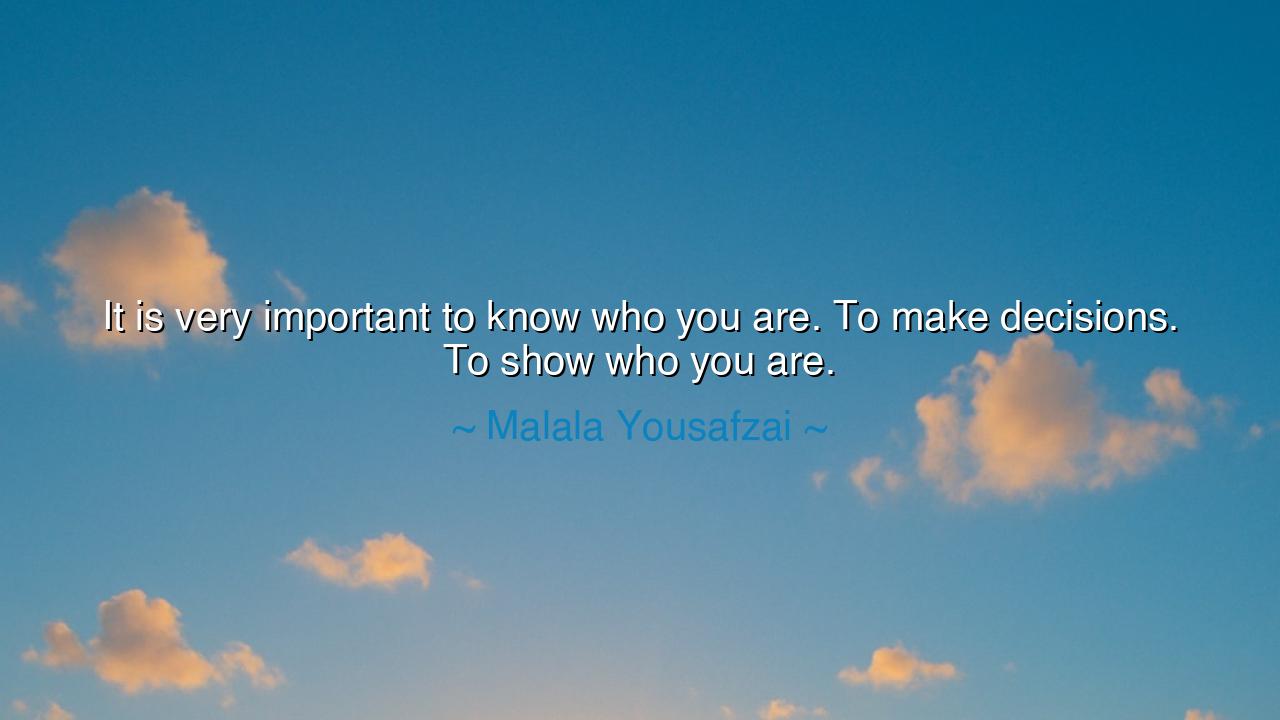
It is very important to know who you are. To make decisions. To






Hear, O seeker of truth, the words of Malala Yousafzai, the girl who faced death yet rose to speak for millions: “It is very important to know who you are. To make decisions. To show who you are.” This saying is not born from idle reflection, but from fire and blood, from the trials of one who stood before oppression with nothing but the strength of her identity. Her words carry the weight of ancient wisdom—that to live without knowing oneself is to drift like a leaf upon the wind, but to know oneself is to walk as a pillar upon the earth.
To know who you are is the foundation of all courage. For the world will cast upon you many voices, each demanding obedience, each seeking to shape you into its likeness. If you do not know yourself, you will be molded by fear, bent by scorn, and broken by pressure. But if you know your heart, your purpose, your truth, then no storm can uproot you. This is the first labor of the soul: self-knowledge, the discovery of the eternal flame within.
To make decisions flows naturally from this knowledge. A man or woman without identity hesitates, sways, and falters at every crossroad. But the one who knows who they are moves with clarity. Their decisions are not guesses, but declarations of the self. Each choice becomes an act of creation, shaping the world according to their inner truth. Thus decision is not merely the act of choosing, but of proclaiming to the universe: “This is who I am, and this is the path I walk.”
To show who you are is the final and greatest test. Many know themselves in secret but hide from the world, fearful of judgment or harm. But to stand openly, to show by word and deed the truth of your being, is to live authentically. Malala herself knew this cost: she showed who she was—a girl demanding education in a land that sought to silence her—and for this, she was struck by the assassin’s bullet. Yet her truth could not be killed, and by showing who she was, she gave courage to countless others to do the same.
Consider also the tale of Socrates, the philosopher of Athens. He knew who he was: a servant of truth. He made decisions in accordance with this calling, questioning, challenging, seeking wisdom. And when condemned by his city, he refused to renounce himself. He drank the hemlock rather than betray his soul. Thus his life and death echo Malala’s teaching: to know, to decide, to show. The cost may be great, but the reward is eternal honor.
The meaning is plain: identity is power, decision is freedom, authenticity is victory. To live otherwise is to wear masks until one forgets the face beneath. The world hungers not for shadows, but for men and women who shine in their true form. And only those who know themselves can give this light.
Therefore, O listener, take this lesson as a command: seek first to know yourself. Ask what you love, what you serve, what you are willing to suffer for. Then let your decisions flow from that knowledge, steady as the river. And finally, be not ashamed to show it—stand openly in your truth, whether praised or persecuted. For in doing so, you join the company of the brave, who by their authenticity change the world.
Thus the teaching endures: “It is very important to know who you are. To make decisions. To show who you are.” Let this be the rhythm of your life: know, decide, show. In this rhythm lies the strength to endure, the courage to act, and the legacy to inspire those yet to come.






AAdministratorAdministrator
Welcome, honored guests. Please leave a comment, we will respond soon